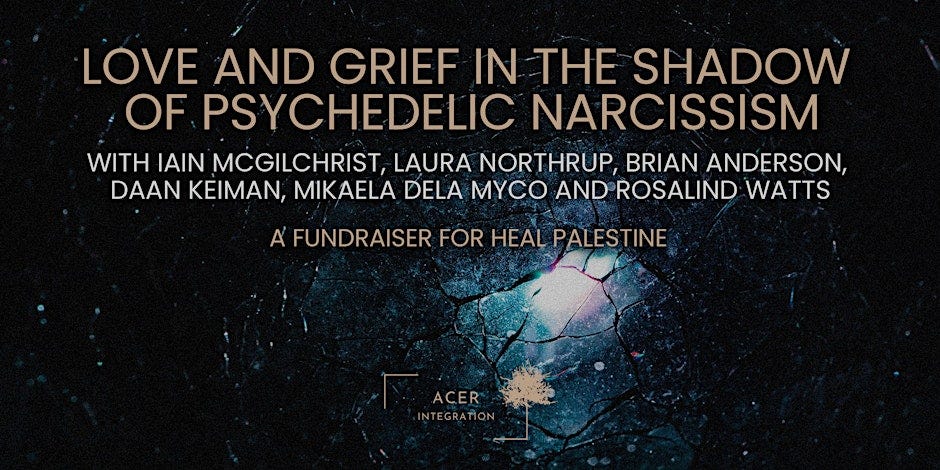What's the Solution?
Amy Elizabeth Fox has an inspiring vision for transforming company cultures.
I write Toxic Workplace Survival Guy because toxic workplaces make me angry. I want to help as many people as possible do as I did: survive long enough to emerge with my mental health, dignity and career intact, on my own terms. A big thank-you to all those who’ve become paid subscribers.
Live Event: I’m delighted to share that I’ll be making my first live appearance as Toxic Workplace Survival Guy next month, at Love and Grief in the Shadow of Psychedelic Narcissism, an online event hosted by Dr Rosalind Watts’ Acer Integration community on Thursday, 23 May 19:00-21:30 BST. Tickets here.
“It’s a very quick move from frozen to love, and I think there’s a tremendous amount of hope in that.” — Amy Elizabeth Fox, chief executive officer of Mobius Executive Leadership.
Survival Tool#17: Hold A Vision
Toxic Workplace Survival Guy’s priority is to share practical guidance and resources to help you turn your toxic workplace ordeal into a source of wisdom and growth. (Survival Tool#7: Reframe Your Predicament).
But once in a while, Toxic looks to the horizon, and asks:
What might be possible if leaders took their responsibilities for creating healthy institutions seriously?
What kind of interventions could unlock change?
Who would we have to be to allow that change to happen?
I’ve just watched a recording of a keynote address by Amy Elizabeth Fox, chief executive of Mobius Executive Leadership, a Massachusetts-based, global community of leadership practitioners, which points to some answers. (If you’re in need of inspiration, I recommend watching the entire 40-minute speech, given at Mobius’ Next Practice Institute gathering last October).
I loved both the clarity of Fox’s diagnosis of the dysfunction operating in many companies, which we’ll all recognise, and her vision of an alternative.
“In our programmes, we often do an exercise in which we ask executives to make a list, a rigorous inventory one might say, of how they numb themselves,” Fox says. “What are the small behavioural hacks, and large addictions, that they use to keep outside from their own felt experience? And you get a very long list. You get a list that ranges from things we think of as normal everyday life, like addiction to social media, overwork, distraction, trivialisation of attention, to things that we take gravely but don’t tend to treat in corporate intervention: addiction, unethical behaviour, lack of purpose.”
Fox continues:
“Then we talk about the costs of that numbing. And people say things that are beyond poignant, perhaps to themselves for the first time: I lose my sense of myself; I don’t pay attention to my family enough; I don’t know what matters to me; my heart feels flat and bored; I don’t have access to my own creativity and spark of life.”
Many of us who’ve worked in toxic workplaces will have noticed such symptoms in our superiors — and may well have detected them taking root in ourselves.
Fox says the answer is to cultivate the kind of “transformational leadership” skills taught by Mobius practitioners, which rest on five qualities:
Self-awareness and self-inhabiting – I know myself more, and I live in a state of self-contact and presence.
Relational attunement and extension – I’ve learned to sense other people, and to extend the field of my care and compassion wider than the circumference of my own being.
Group coherence and connection – I’ve learned to help foster a true sense of attunement and stillness in a field of more than two people.
Systemic emergence – I’ve learned to “melt frozen life,” and allow the wind of innovation to enter the field of our shared presence.
Collective restoration – The art of mystical healing, which means I can bring eternal love into every moment.
All this might sound rather remote from the daily grind of life in a toxic workplace, particularly if we’re battling to defend our boundaries from leaders with narcissistic personality styles. (Survival Tool#8: See Through the Confusion).
Nevertheless, my immersion in spaces devoted to healing collective and inter-generational trauma in recent years has left me sharing Fox’s confidence that we all possess enormous latent capacities to express these kinds of qualities. (Fox is teaching a course on trauma-informed consulting and coaching with Thomas Hübl, who leads the trauma integration training I’ve been pursuing). (Resonant World#79: Why I’m Training as a Collective Trauma Integration Facilitator).
And we can reclaim these capacities relatively quickly, given the right combination of group support and skilled facilitation.
This knowledge isn’t yet widely recognised.
I’m sure many of us can imagine senior leaders at places we’ve worked reacting with the kind of resistance Fox describes:
“What happens…most times when we’re pitching these…deep transformational sessions, clients will say: ‘That’s very interesting, but I really don’t think our people would do that.’
“What they are basically saying is that we’re incapable of living by a different set of norms. We’re stuck in the givens of the society that’s woven by a trauma fabric, and our people are so committed to their shields and their walls that I don’t feel brave enough to be an invitation that it could be otherwise.”
When executives do take the plunge, however, it doesn’t take long for most of them to start to rediscover their humanity.
British psychotherapist Nick Duffell has written about the “strategic survival personality” that many of us develop to survive trauma in early life, and how this shapes the domineering and unempathic style of many political and corporate leaders. (Resonant World#68: Why Sultan Ahmed Al Jaber Needs A Men’s Circle).
But Fox says it doesn’t take long to bring participants in Mobius programmes into contact with deeper dimensions of themselves.
“They come on Sunday night, they’re scared, they’re formal, they’re usually pretty numb. They’re pretty routinised in how they interact with each other. By Thursday or Friday, they are singing, they are dancing, they are cradling each other. It’s a very quick move from frozen to love, and I think there’s a tremendous amount of hope in that.”
This may sound like cold comfort if you’re stuck (for now) in a toxic workplace.
Nevertheless, as we plan our escape, it’s good to remember that there are people and organisations out there working towards the transformation Fox describes.
And we don’t have to wait for our bosses or companies to begin the journey.
Each of us already possesses the capacity for transformational leadership inside of ourselves.
Summary
Toxic workplaces grind us down. Remember that there are many people around the world working to transform dysfunctional institutions, and that we each possess latent capacities to connect with each other — and ourselves — at a much deeper level than we’ve been taught. You are not who you think you are.
Recommended Reads
I recently discovered the excellent work of Nathalie Martinek on navigating narcissism at work. I highly recommend her substack Hacking Narcissism:
And here is an excellent description of a company’s decline into toxicity from Nausherwan Ghaffar:
And for more on the kind of inner work I write about above, please check out my sister publication Resonant World:
I consult on surviving toxic workplaces; and can also help you navigate your toxic workplace via the Tarot. Click here to inquire:
I write Toxic Workplace Survival Guy during my spare time from working as an editor at nonprofit climate news service DeSmog (a model workplace). Subscribing, sharing, liking, commenting or buying me a coffee helps make this project sustainable. Thank you!






